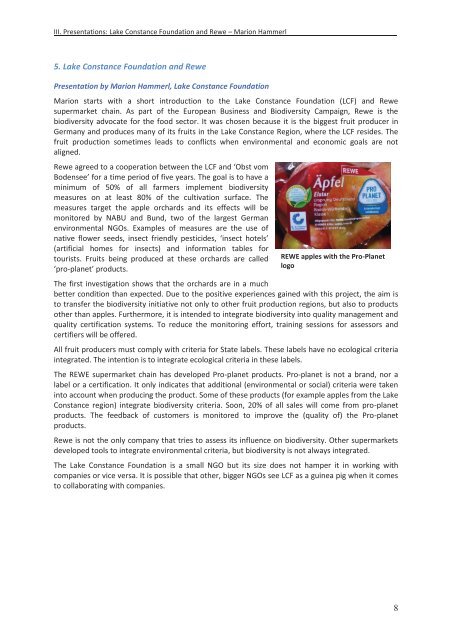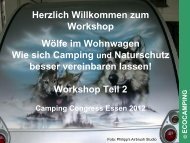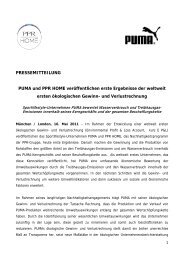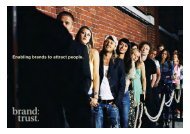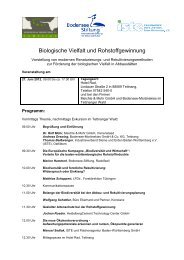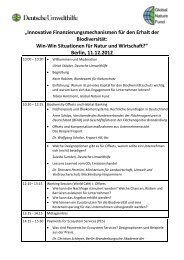here - the European Business and Biodiversity Campaign!
here - the European Business and Biodiversity Campaign!
here - the European Business and Biodiversity Campaign!
Create successful ePaper yourself
Turn your PDF publications into a flip-book with our unique Google optimized e-Paper software.
III. Presentations: Lake Constance Foundation <strong>and</strong> Rewe – Marion Hammerl_____________________________<br />
5. Lake Constance Foundation <strong>and</strong> Rewe<br />
Presentation by Marion Hammerl, Lake Constance Foundation<br />
Marion starts with a short introduction to <strong>the</strong> Lake Constance Foundation (LCF) <strong>and</strong> Rewe<br />
supermarket chain. As part of <strong>the</strong> <strong>European</strong> <strong>Business</strong> <strong>and</strong> <strong>Biodiversity</strong> <strong>Campaign</strong>, Rewe is <strong>the</strong><br />
biodiversity advocate for <strong>the</strong> food sector. It was chosen because it is <strong>the</strong> biggest fruit producer in<br />
Germany <strong>and</strong> produces many of its fruits in <strong>the</strong> Lake Constance Region, w<strong>here</strong> <strong>the</strong> LCF resides. The<br />
fruit production sometimes leads to conflicts when environmental <strong>and</strong> economic goals are not<br />
aligned.<br />
Rewe agreed to a cooperation between <strong>the</strong> LCF <strong>and</strong> ‘Obst vom<br />
Bodensee’ for a time period of five years. The goal is to have a<br />
minimum of 50% of all farmers implement biodiversity<br />
measures on at least 80% of <strong>the</strong> cultivation surface. The<br />
measures target <strong>the</strong> apple orchards <strong>and</strong> its effects will be<br />
monitored by NABU <strong>and</strong> Bund, two of <strong>the</strong> largest German<br />
environmental NGOs. Examples of measures are <strong>the</strong> use of<br />
native flower seeds, insect friendly pesticides, ‘insect hotels’<br />
(artificial homes for insects) <strong>and</strong> information tables for<br />
tourists. Fruits being produced at <strong>the</strong>se orchards are called<br />
‘pro-planet’ products.<br />
REWE apples with <strong>the</strong> Pro-Planet<br />
logo<br />
The first investigation shows that <strong>the</strong> orchards are in a much<br />
better condition than expected. Due to <strong>the</strong> positive experiences gained with this project, <strong>the</strong> aim is<br />
to transfer <strong>the</strong> biodiversity initiative not only to o<strong>the</strong>r fruit production regions, but also to products<br />
o<strong>the</strong>r than apples. Fur<strong>the</strong>rmore, it is intended to integrate biodiversity into quality management <strong>and</strong><br />
quality certification systems. To reduce <strong>the</strong> monitoring effort, training sessions for assessors <strong>and</strong><br />
certifiers will be offered.<br />
All fruit producers must comply with criteria for State labels. These labels have no ecological criteria<br />
integrated. The intention is to integrate ecological criteria in <strong>the</strong>se labels.<br />
The REWE supermarket chain has developed Pro-planet products. Pro-planet is not a br<strong>and</strong>, nor a<br />
label or a certification. It only indicates that additional (environmental or social) criteria were taken<br />
into account when producing <strong>the</strong> product. Some of <strong>the</strong>se products (for example apples from <strong>the</strong> Lake<br />
Constance region) integrate biodiversity criteria. Soon, 20% of all sales will come from pro-planet<br />
products. The feedback of customers is monitored to improve <strong>the</strong> (quality of) <strong>the</strong> Pro-planet<br />
products.<br />
Rewe is not <strong>the</strong> only company that tries to assess its influence on biodiversity. O<strong>the</strong>r supermarkets<br />
developed tools to integrate environmental criteria, but biodiversity is not always integrated.<br />
The Lake Constance Foundation is a small NGO but its size does not hamper it in working with<br />
companies or vice versa. It is possible that o<strong>the</strong>r, bigger NGOs see LCF as a guinea pig when it comes<br />
to collaborating with companies.<br />
8


